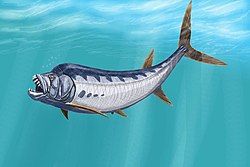Xiphactinus - Simple English Wikipedia, the free encyclopedia
| Xiphactinus Temporal range: Cretaceous | |
|---|---|
 | |
| Scientific classification | |
| Kingdom: | |
| Phylum: | |
| Class: | |
| Order: | |
| Family: | |
| Genus: | Xiphactinus |
| Type species | |
| Xiphactinus audax | |
Xiphactinus (from Latin and Greek for "sword-ray") was a large, 4.5 to 5 m (15 to 20 feet) long predatory bony fish that lived in the Western Interior Sea, over what is now the middle of North America, during the Late Cretaceous. Skeletal remains of Xiphactinus have come from Kansas, Alabama, and Georgia in the United States, as well as Europe and Australia.
Description
[change | change source]Above all else, Xiphactinus was a great swimmer, able to speed towards or away from virtually anything else in the seas of the time. It may have been able to leap above the waves at times to help dislodge parasites from its skin. It was not however immune from attack. If injured, its large size meant it was easy to spot and could become prey for sharks, mosasaurs, and other Xiphactinuses.
Species
[change | change source]- Xiphactinus audax Leidy, 1870 (type)
- Xiphactinus vetus Leidy, 1856
Related pages
[change | change source]References
[change | change source]- "State Fossils - Kansapedia - Kansas Historical Society".
- "List of State Fossils". State Symbols, State Fossil. Fossilera. Retrieved September 1, 2015.
Further reading
[change | change source]- "Kansas Rep. Tom Sloan agrees to back X-fish as state's official fossil / LJWorld.com". .ljworld.com. Associated Press. 2010-10-26. Retrieved 2011-10-12.
Other websites
[change | change source]- Carnegie Museum Archived 2004-11-14 at the Wayback Machine


 French
French Deutsch
Deutsch